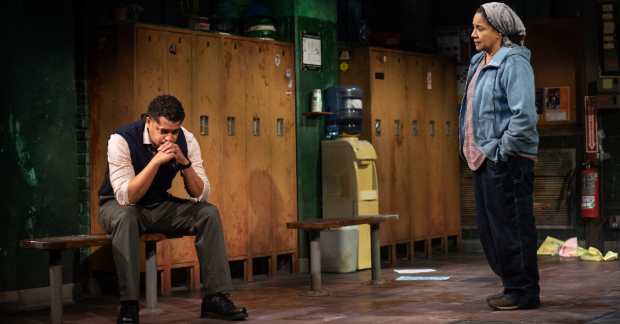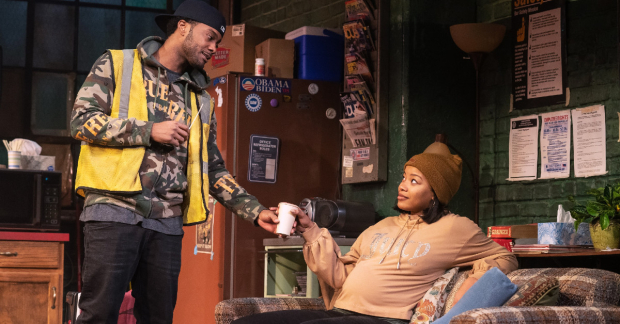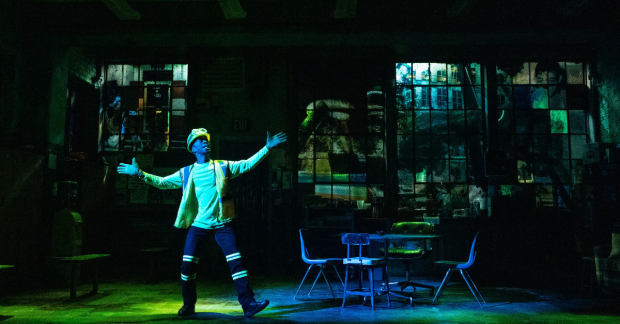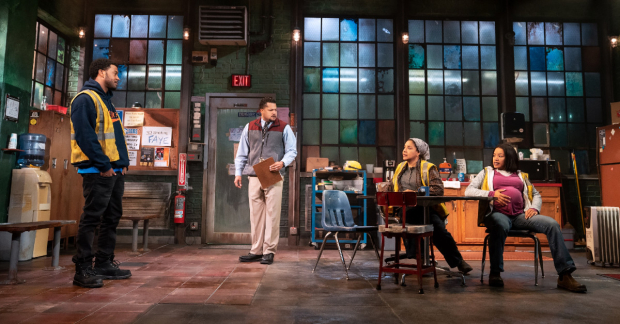Review: American Workers Get Their Day on Broadway in Skeleton Crew
Dominique Morisseau’s play about the people who keep America going shines in a production directed by Ruben Santiago-Hudson.

(© Matthew Murphy)
Some plays never really feel out of date. Dominique Morisseau's Skeleton Crew takes place as the American economy was crumbling in 2008 and Detroit's auto plants were going under one by one. Now more than a decade later the same blue-collar workers who suffered disproportionately then are suffering now as the Covid pandemic upends livelihoods. Morisseau's play premiered off-Broadway in 2016 at Atlantic Theatre Company with Ruben Santiago-Hudson directing, but the play resonates perhaps even more now than it originally did. Santiago-Hudson helms the production again in its Broadway outing with a phenomenal cast led by Phylicia Rashad and Brandon J. Dirden. With hard times facing blue-collar workers around the country, Morisseau's play feels more than anything like a tribute to the workers who get far too little recognition for what they do.
The play unfolds during a bone-chilling winter in Detroit just as the economy is about to take the big nosedive that would become known as the Great Recession. In the break room of a stamping plant, Faye (Rashad) smokes her Marlboros despite the No Smoking signs directed specifically at her. She's been there a long time and she's a union rep, so signs be damned; but she'll put out her smoke for the sake of Shanita (Chanté Adams), a young pregnant worker who grudgingly puts up with the persistent flirting of Dez (Joshua Boone). Dez is young, but he knows what's up, and he has a strong hunch that the plant is about to shut down and leave them in the lurch — and he thinks Faye is holding back on that info.

(© Matthew Murphy)
Turns out, he's right. Their boss, Reggie (Brandon J. Dirden), has let her know in strict confidence that the plant will shut down within the year. But Reggie cares about his people, so he's stuck between management and his loyal team. He knows Dez has dreams of owning his own auto garage, Shanita has a baby on the way, and Faye needs help that she's too proud to ask for. Does he come down hard on them with a new stack of rules designed to weed out the "dead weight," or does he stick by them when they need him most? How do you fight for what's right, he wonders, without jumping on a grenade?
Santiago-Hudson lets Reggie's and the others' lives and secrets quietly bubble to the surface as we sit on the edge of our seats, and Morisseau's conversational language makes us feel like we know them too. Rashad gives a hilarious portrayal of Faye, who stoically maintains her strength and dignity even after she loses her home. Boone gives an eminently smooth, at times intense performance at Dez, a man who knows that in this world he's always got to be looking over his shoulder.

(© Matthew Murphy)
As Shanita, Adams plays the kind of worker who cares deeply about her job and feels that what she does at the plant is important, not just for her but for the person who's going to get into a car she helped make. And Dirden does a fine job conveying the conflict of a man caught between the job he's worked long and hard for, and the people he's come to consider family rather than just cogs in a machine. Adesola Osakalumi, who originated the role of the Performer in the off-Broadway production, does self-choreographed popping routines in musical interludes (with original music and lyrics by Jimmy Keys, and music by sound designer Rob Kaplowitz) to show us how the team members are, in fact, often considered to be mechanical — and easily replaceable — parts of factory assembly lines. Nicholas Hussong's projections during these interludes drive that idea home.

(© Matthew Murphy)
Along with Morisseau's spot-on dialogue, the creative team captures the workers' reality in the break room with a meticulously detailed set designed by Michael Carnahan, complete with Obama-Biden sticker on the fridge. Emilio Sosa's costumes are working-class casual complemented by hard-hats worn with pride. It's that pride that Morisseau wants to pay tribute to, and in a play that might have nothing but bad awaiting its characters as the huge thumb of capitalism hovers over their heads, we're left with a little bit of hope. When you can't depend on the higher-ups to have your back, you've gotta have each other's. That's how you get through times like these.











